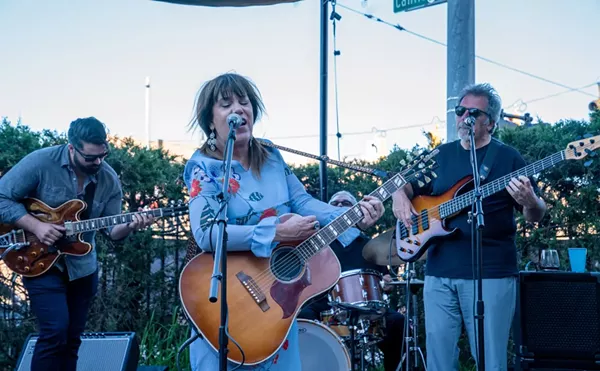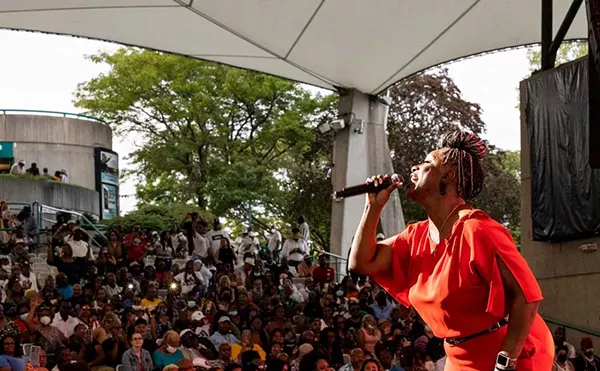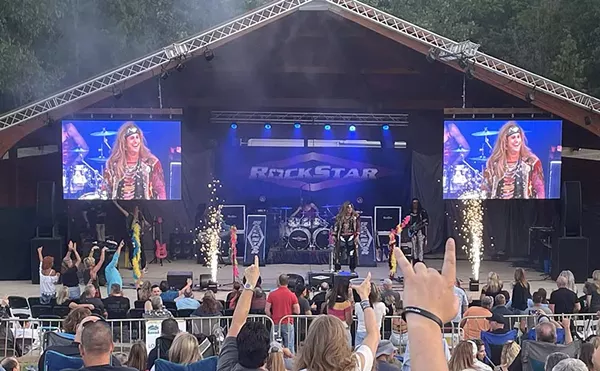Dr. John on going to church, Sonny & Cher, Louis Armstrong, Cosimo Matassa, Bobby Charles, the Stooges, and much more

Audio By Carbonatix
[
{
"name": "GPT - Leaderboard - Inline - Content",
"component": "35519556",
"insertPoint": "5th",
"startingPoint": "3",
"requiredCountToDisplay": "3",
"maxInsertions": 100,
"adList": [
{
"adPreset": "LeaderboardInline"
}
]
}
]
What follows is the interview Metro Times conducted with Dr. John, as we had the opportunity to talk with him on Fat Tuesday, 2015. He wasn't scheduled to appear here at the time, but he graciously spoke with us on a variety of topics.
Metro Times: Happy Fat Tuesday to you, sir.
Dr. John: Oh man. It’s not the happiest Fat Tuesday I could have ever experienced.
MT: I’m sorry; what’s going on?
Dr. John: We were supposed to be playing a gig in Nashville today. And which we obviously can’t play because it's icy and snowy and so forth and et cetera.
MT: So this new record that you’re playing material from on this tour, you obviously have interesting arrangements and I love how you took "Wonderful World" and really changed it up. Were you worried at all about working with material that’s so well known? Was there a governing philosophy behind it?
Dr. John: Well actually, Louis came to me in a dream, and gave permission, said he wanted to hear his songs through my musical way. That was about a year and a half ago, two years ago maybe.
MT: So New Orleans and Detroit are always getting compared, not always favorably, curious how you see any similarities...?
Dr. John: Can I just tell you something? Berry Gordy came to New Orleans and he wanted to buy a Johnny Adams record. And it was my song and Johnny was singing "A Losing Battle." And Berry didn’t get to buy the record because my boss didn’t know who he was. And of all the famous people in the world, he was the most famous guy in the record business at the time. That was like ridiculous and me and my partner, Edgar Blanchard, we were just like how could this guy not know who Berry Gordy is? But Joe Ruffino didn’t know who he was. And that's life on the reality kick.
MT: I bet you guys were a little bit devastated by that.
Dr. John: Oh, me and Edgar Blanchard were totally devastated. Edgar was a great guitar player and a great baritone saxophone player. He was really a slammin’ musician. He played on a few of Ray Charles' records. He was really a slammin’ one.
MT: Speaking of, do you remember playing with Robby Baron? Walter Davis?
Dr. John: They were all my partners, man. Walter Davis Jr. was my partner. I had so many old partners back in the game. It was wild. I remember we were sitting in the back of a church once upon a time, and we were really doing some wrong stuff in a church. And this priest came out and told us we were doing something completely incorrect in a church. Me, And Walter Davis Jr. and I forget who else who we were with but it was some musician that was well known. But the guy, he didn’t stop whatever he was doing. Oh God, it was just crazy. That was life, how it was in those days.
MT: One thing, my own work involves producing reissues of gospel records. And on this new record you got the Blind Boys, still great shouters. I'm curious what gospel music you heard coming up and how it influenced you? Just in New Orleans you had the Zion Harmonizers, Sister Gertrude Morgan, and Rev. Utah Smith...
Dr. John: I knew all of the Spiders guys when they were gospel singers, before they were the Spiders; I knew them as the Zion Harmonizers. I knew so many really great gospel groups and then I knew Frank Lastie [whose family had the Guiding Light Spiritual Church in the 9th Ward].. I got to play there, and I loved playing at Frank Lastie’s church, a giant, spiritual church.
MT: Where was it?
Dr. John: It was in the lower ninth ward, and it was just one of those dream places. When my father passed they took me in and they just made me feel great. I loved to play in that church. I was just something special. There was no other church that everybody of every faith was welcome. It was really special.
MT: Did you guys have that experience of being out all night on Saturday and going and playing on church on Sunday?
Dr. John: Oh we had to play in so many churches that it was like ridiculous. I couldn’t even imagine how many churches we actually played in.
MT: That includes Allen Toussaint and the Nevilles and everybody, that’s just part of what you guys did?
Dr. John: Well, we had to do certain things, you know.
MT: Part of being a working musician?
Dr. John: Yeah.
MT: One Detroit-based question for you: I read that you did a show with the Stooges and Sun Ra and you went onstage at one point, maybe? This would be 1969; do you remember this?
Dr. John: OK, I do remember some stuff. I remember this one guy with the Stooges, the singer, he hit a couple of the musicians in his band in the mouth, with his microphone. I thought it was completely off the hook. And I remember me and Sun Ra and a couple of guys just laughing our ass off because it was just ridiculous.
MT: I love that. Did you spend much time with him and the Arkestra? Because I'm curious if maybe some of your late 60’s work, like that Babylon record, is influenced by that?
Dr. John: Miles [Davis] said that he thought that record was influenced by Sun Ra. I couldn't think of it being connected to that, but it could have been.
MT: I'm curious to know your take on how Latin music influenced New Orleans music, specifically Cuban stuff.
Dr. John: Well I think a lot of the music, even the early jazz had a lot to do with the Cuban music. I know that my father sold jazz records, bebop and Afro-Cuban music and traditional jazz. Now those three kind of musics don’t exactly fit as a group. If you take with the Machito and his Afro-Cubans, and what a lot of the bands were doing back then, then you could see it.
MT: Later you worked with and signed to Atlantic Records, but surely Jerry Wexler and Ahmet Ertegun were in New Orleans before you put records out as Dr. John in the late 1960s. So how did you come to meet hose guys?
Dr. John: I got to meet Ahmet one way, and I met Jerry Wexler another way. All these guys was like very like down with the music, no matter what kind they approached. That’s what I loved about those cats, man.
MT: You get that sense from the records they did.
Dr. John: On of the things that Ahmet did that just cracked me up. It was his thing with Max Roach. And Max was I think with the girl that sang "Stormy Weather," I can’t remember her name. The girl that sang "Stormy Weather," but it wasn’t his wife. Anyway, she was a bad singer. But I remember Ahmet would come and cuss and it just was ridiculous. But he was saying blah blah blah whatever he was saying. Max looked at me and said, 'Man that record you made with Art [Bluesiana Triangle], he said 'That was the last record Art did, and we heard it at his funeral, and how you got Art to play the piano again was phenomenal.' So I felt really good about that. That I had gotten Art to play the piano on this record.
MT: Is it true that Gris Gris was cut using leftover studio time from sessions with Sonny and Cher?
Dr. John: Yeah.
MT: That's ridiculous; so you would just hang out afterwards they would take off back to their hotel or whatever and you would stick around?
Dr. John: It was like, we didn't have to worry about them coming in the studio at all. There just was this leftover studio time, which would go to our studios. I do remember, right at that same time, in the same studio, Hugh Masekela did his first record. I do remember that.
MT: Did you listen in on what he was doing?
Dr. John: No, but I got a lot of stuff out of it after. Man, I was shocked at what he had been doing and what we had been doing. And he was shocked at what we was doing. We were both blown away. And he kept promising to do something with Miriam Makeba and me. But it never happened because we could never get our schedules together. I made a gig in Nigeria in 1970, but I only made that one gig.
MT: How often did you cross paths with Bobby Charles?
Dr. John: He was my partner man, Bobby was a dear friend of mine.
MT: What was he like, and did you guys record together?
Dr. John: He and I were working on a record together. He was writing absolutely his last record, and I was writing, and he actually made it a lot of fun. But he passed away right before the record was finished. It was a nightmare. We had a bunch of songs we had written years and years before that, maybe 25 years before that. We wrote these songs; they were all going to be on a record called Tribal. It was real sad because Bobby passed away during the writing of the songs. It was just amazing that he never stopped to put anything together for himself, but he would do stuff with me and whatever guys I got, that was special. I produced his last album.
MT: I apologize for not knowing that.
Dr. John: Don’t worry. Bobby was my partner, and we’ll always be partners.
MT: Do you think there was something to playing probably pretty beat-up pianos when you were first playing around that influenced you, maybe Professor Longhair and James Booker, too? Was there something that you had to learn to work with there?
Dr. John: I remember playing on this really ridiculous piano that Cosimo [Matassa] had back in the game that was so out of tune but it you could float. And that was a hit thing about that piano. That was a special thing about it.
MT: How early did you start to hang out with James Booker? He described his music as old soul with new wrinkles, which could apply to so much of New Orleans music, I think.
Dr. John: Booker taught me, and later he taught Harry Connick Jr, at two different times of his life. But he taught me to play the organ for a gig, and he taught Harry how to play piano, and that was a completely different thing. I loved the way he taught me, just because I was guitar player before that. And I just always think of life through a guitar player's eyeballs.
MT: When you were coming up their weren't all the books on music history that there are now. How did you know and understand Congo Square?
Dr. John: I actually knew stuff about Congo Square from early on. But my family lived in Tremé early on and they knew about Congo Square. They knew about the actual bayou that was on Bayou Road. They knew that and they lived in there a long long time ago, like hundreds of years ago.
MT: Did your parents take you to parades for Mardi Gras, or the parades would just go down the street where you lived, right?
Dr. John: No, you had to do. It was all the Indian tribes, they were all in my neighborhood. You had the Golden Blades, and the Red White & Blues. all of the different tribes was in my neighborhood. You had to roll with everything. And the Golden Blades were deadly guys. The Choctaws, they’re really the real deal but they’re also the Mardi Gras Indians too.
MT: So the Mardi Gras Indians grew out of these street gangs?
Dr. John: Yeah they did grow out of that but they also came straight up from the guys that were like you had to deal with, in real life they had to be around that. And it was special.
MT: You grew up completely surrounded by so much music from a really young age, then?
Dr. John: Yeah, my father had a record shop and I always remember that. And there was just so much music around me, yes. My sister used to sing with Fats Pichon’s band [and he] was probably Earl Palmer’s father. And Earl was probably the greatest studio drummer of all time. And Earl, he just wrote a book called Backbeat, and it's a great book. But it doesn’t show him for what he really was, the greatest studio drummer of all time. He probably played on more hit records and hit movies than any studio drummer will ever play on.
MT: Were you friends with Irma Thomas?
Dr. John: Oh yeah. I played on some of her records.
MT: What about Ernie K-Doe?
Dr. John: I didn’t play on any of his records, but I did know him and I worked gigs with him and stuff.
MT: Did you ever hang out at his place?
Dr. John: I was always around the studio. I was hanging at the studio when Little Richard cut "Tutti Frutti." I was hanging at the studio, oh man. Back in those days, you got to be a part of all of the scene to get everything that you could get. I hung out at the Press Reel, I hung out at the Texas Lounge. In fact I’m looking at a guys picture that’s in a wheelchair and I called him Mr. Green. His real name wasn’t Mr. Green, but he was a good guy. And he would let me in the Texas Lounge and the Press Reel and I’d sit with the musicians and I’ll always remember that. I was way too young to get into these clubs [without help]. I would hear so many great people. It used to be so much talent here that it was ridiculous.
MT: Did you hang out at your dad’s record store?
Dr. John: I would go with my dad when the P.A. systems would break at clubs. I was more into being with the musicians than with the records.






